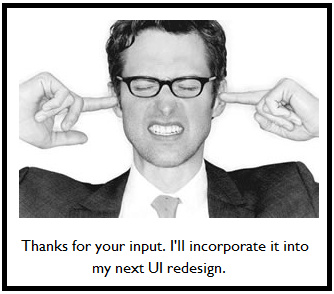By Saeed Khan
 Here’s a question that’s troubling me a fair bit.
Here’s a question that’s troubling me a fair bit.
As much as we can talk about what is or isn’t good from a UX/UI perspective, the fact is that in the end there is a lot of subjectivity involved in defining “good” or “bad” UX/UI.
It’s really easy to spot a bad interface. Lots of unnecessary clicks or field or whatever. And when you see a great interface, it’s just obvious.
But there is a LOT of space in between, which is where most of us live. And in that space there is usually a lot of debate about what constitutes a good interface (dialog boxes, wizards, navigation trees, layouts etc.). Everyone involved will have an opinion of how good (or bad) something is, how a dialog or fields should be laid out, whether popups, tabs, wizards etc. should be used.
And some of those same people may actually have valid reasons to support their opinions. 🙂
The question is:
When designing a new user interface (or redesigning an existing one) what steps or process do you (or your designers) follow to minimize the amount of subjectivity in deciding on the merits of a particular UI design?
I know there is no absolute right answer here, but any techniques, processes or other aids you can provide would be incredibly helpful.
Thanks
Saeed
P.S. I posted this question here on Quora. I’ve copied some of the responses below in the comments.
Tweet this: How can you minimize subjectivity in UX/UI Design? http://wp.me/pXBON-32Y #prodmgmt #ux #ui #interaction